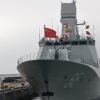Three key senior congressional staff members gathered last Thursday for an enlightening discussion in The Heritage Foundation’s annual “View from the Hill” event, hosted by Walter Lohman, director of the Asian Studies Center.
Edward Burrier, a professional staffer for Congressman Ed Royce (R–CA) on the House Foreign Affairs Subcommittee on Terrorism, Nonproliferation and Trade;Joel Starr, counsel and foreign affairs legislative assistant to Senator Jim Inhofe (R–OK); and Chris Socha, legislative director and foreign policy advisor to Senator James Risch (R–ID), also examined current policy toward Asia and described their ideas to strengthen ties with U.S. allies and defend our interests abroad.
The Daily Signal depends on the support of readers like you. Donate now
The Philippines is a country that has been largely ignored in Washington in recent years. Not so at The Heritage Foundation on Thursday. The panelists indicated strong support on Capitol Hill for reinvigorating the relationship between the U.S. and its treaty ally. Burrier argued that it is important that our relationship with the Philippines continue to mature from one simply based on counterterrorism efforts.
The Philippines is a key U.S. ally, and a more robust maritime partnership is important, especially given the threats to freedom of navigation in the South China Sea. As opportunities arise to help the Philippines develop the capacity to defend itself, the U.S. should take them. For instance, Manila has expressed an interest in receiving as many as four refurbished decommissioned American Coast Guard cutters. It has gotten one and has one on the way.
Lohman emphasized that, as a non-NATO ally, the Philippines should be first in the queue for the other cutters as they become available. It is a very modest request (the Philippines covers part of the cost) with a big impact on Filipino capability.
The panel also emphasized strong U.S.–Taiwan relations, lambasting the Obama Administration’s shortsighted decision not to sell Taiwan the F-16C/Ds it so desperately needs.
China continues to play a pivotal role in U.S.–Asia relations. Regarding the ongoing South China Sea dispute, the Senate passed last year a resolution reaffirming support for “a peaceful, multilateral resolution” to the dispute there. The resolution also “deplored the use of force by naval and maritime security vessels from China in the South China Sea” and “supported the continuation of operations by the United States Armed Forces in support of freedom of navigation rights in international waters and air space in the South China Sea.”
The panel also echoed Heritage’s longstanding concern that the much-anticipated “pivot” to Asia seems merely cosmetic, as defense cuts seriously undermine our commitment to Asia’s regional security. As China recorded an 11 percent increase in military spending, the U.S. should remain vigilant, because, as Socha said, the U.S. is truly free “when we can defend our interests not only at home but abroad as well.”
Regarding trade, the panel iterated the oft-used phrase that “the business of Asia is business.” Currently, the U.S. is part of only a handful of nations that have trade agreements in Asia, so it is imperative that Congress push the current Administration to promote more free and fair trade throughout Asia.
It is concerning that the Obama Administration is focused almost exclusively on Permanent Normal Trade Relations with Russia—to the detriment of the broader, more important nine-nation (plus Japan) Transpacific Partnership (TPP). Socha argued that without immense engagement from the White House, the TPP will not be successful. In essence, Congress should remain actively engaged in U.S. policy, promoting strong relations with our Asian allies and pushing for free trade agreements.
This year is an election year, but Congress should continue to focus its attention on Asia and promote freedom and defend U.S. interests abroad.
Melanie Passons is a member of the Young Leaders Program at The Heritage Foundation. For more information on interning at Heritage, please visit: http://www.heritage.org/about/departments/ylp.cfm




























